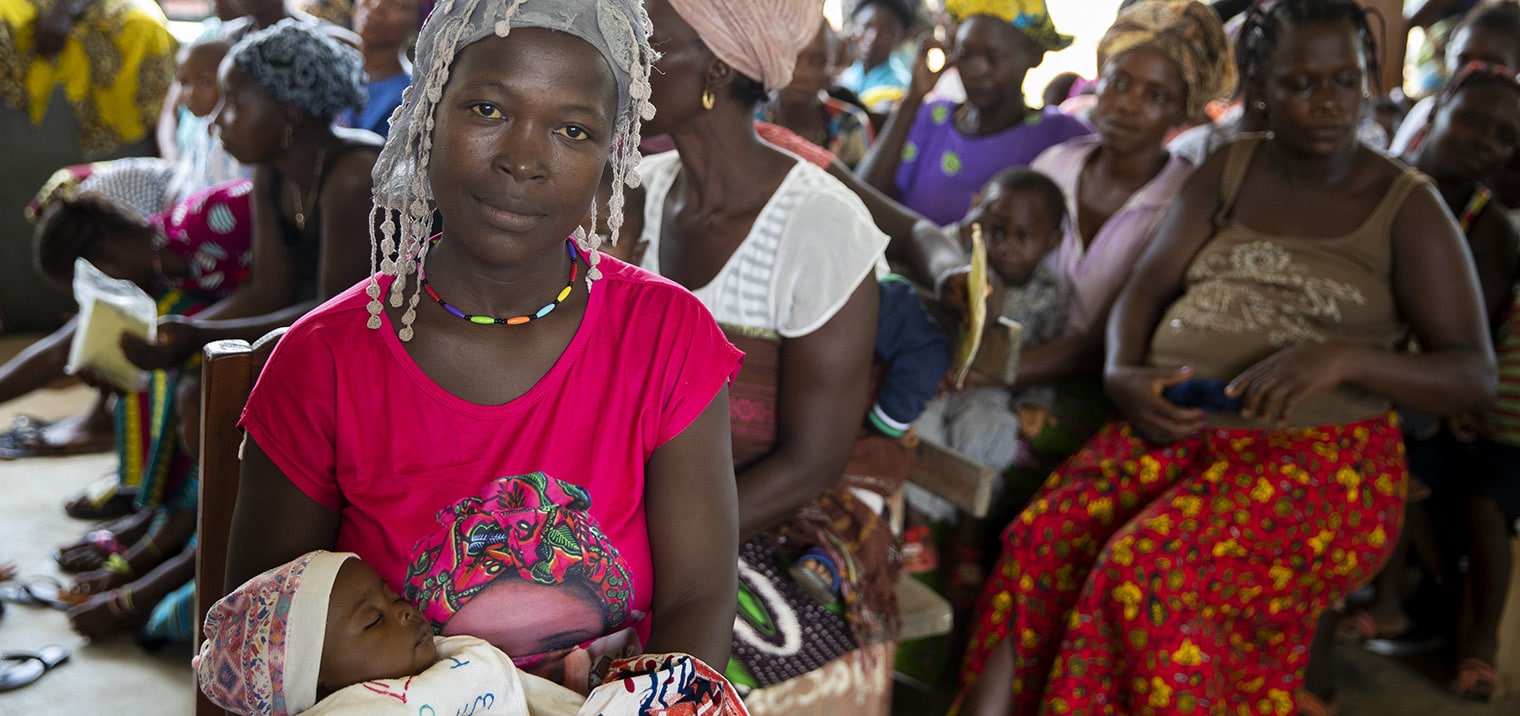
Mother to Mother: Village Care Groups Save Lives in Sierra Leone
The maternal mortality rate is higher in Sierra Leone than anywhere else in the world: One in 17 women won’t survive pregnancy or delivery. The majority of these deaths are a result of preventable causes, exposing a critical lack of information and skilled care. The fact that most of these deaths could have been avoided is a tragedy, but it also means that all hope isn’t lost — that there’s work that can be done to save lives in the future.
Project HOPE is training health care workers and enhancing resources at hospitals and clinics to put an end to preventable deaths. But we’re also stepping beyond facility bounds, into the villages where Sierra Leonean culture comes to life.
Through the facilitation of 21 mother care support groups, we’re empowering mothers with the knowledge they need to take care of themselves and their newborns in their homes and communities. Each group consists of about 20 mothers and is led by a Project HOPE-trained “lead mother” under the direction of Banneh Daramy, Project HOPE’s newborn consultant. Groups meet every week to learn how to recognize and respond to health issues. Lessons cover everything from the value of exclusive and on-demand breastfeeding to the importance of handwashing.
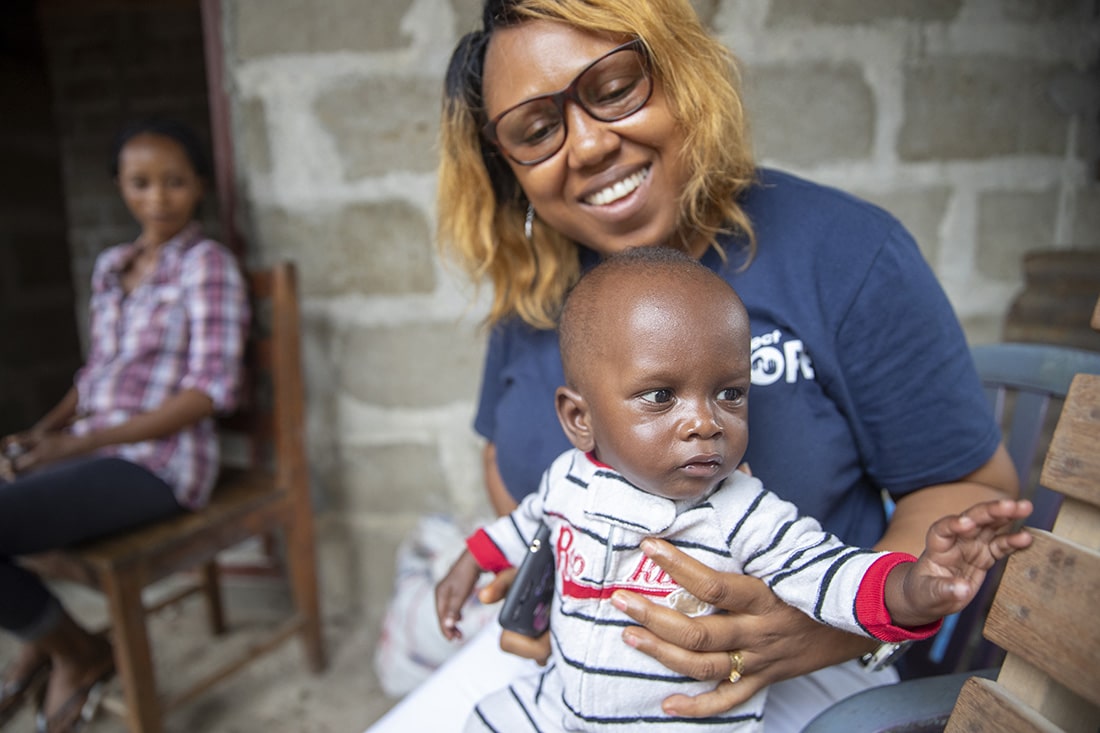
Most mothers never learned to read or write, so educational materials and flip charts include detailed illustrations. But there’s a unique component to the way these groups work to teach and reinforce lessons: use of the spirit and power of song. During meetings, mothers sing and dance to songs with instructional lyrics about pre- and post-natal care and hygiene. Banneh often joins them, playfully coaxing reticent mothers to their feet.
Songs are full of repetition and catchy phrasing, and deliver messages in a way that’s meaningful and resonant. Banneh roughly translates the chorus of a song telling pregnant women when it’s essential to go to the health clinic:“If my feet are swelling, that means trouble. If I have a fever, that means trouble. If I am bleeding, that means trouble.”
“Most of these women aren’t literate,” says Banneh. “They haven’t gone to school since childhood, so we need to put these [lessons] in songs, in local dialects, for them to really learn and remember. And they enjoy it…We want to make them smile.”
Mother care group meetings are more than educational: They’ve become a celebration of motherhood and sisterhood, of their solidarity and shared commitment to improving the lives of their families.
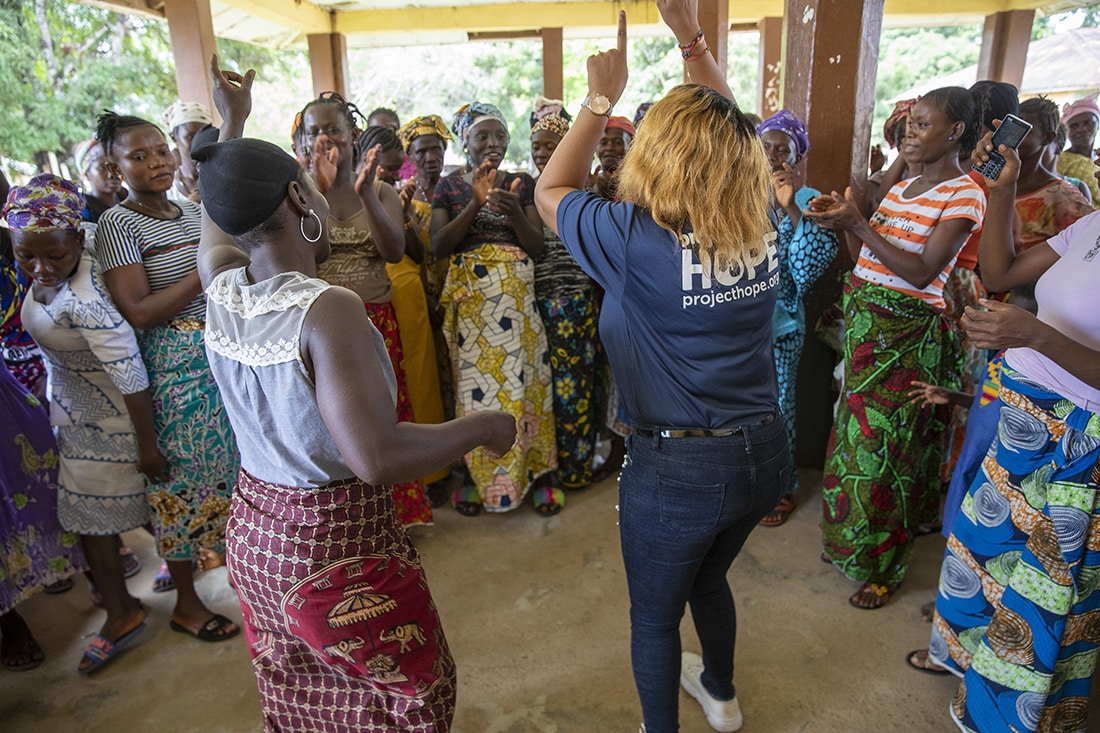

Lead mothers are key
“To be a good lead mother, you need to be organized, committed, and able to motivate others to be proactive in managing their health.”
Lead mothers play a crucial supporting role within their close-knit communities. They teach and train, but they also offer an ear and a shoulder, and pay home visits in between the larger weekly gatherings to follow up on any concerns and offer specialized attention.
Amiie Kangowa, 35, is the lead mother of a group in the small village of Yamandu, in central Sierra Leone. She used to be a traditional birth attendant, and has been lead mother of her group for six months. Amiie has five children of her own — her first baby died at just 3-months-old. She was only 14 years old at the time.
“Talking to pregnant women and lactating mothers, giving them advice and comfort and someone to speak to, playing with newborn children… these are some of the most rewarding parts of the job,” shares Amiie.
To be a good lead mother, she says, you need to be organized, committed, and able to motivate others to be proactive in managing their health.
“Project HOPE really helped me develop how to be a good leader…Giving me the leadership qualities to talk to pregnant and lactating mothers, and helping me acquire knowledge about neonatal care.”
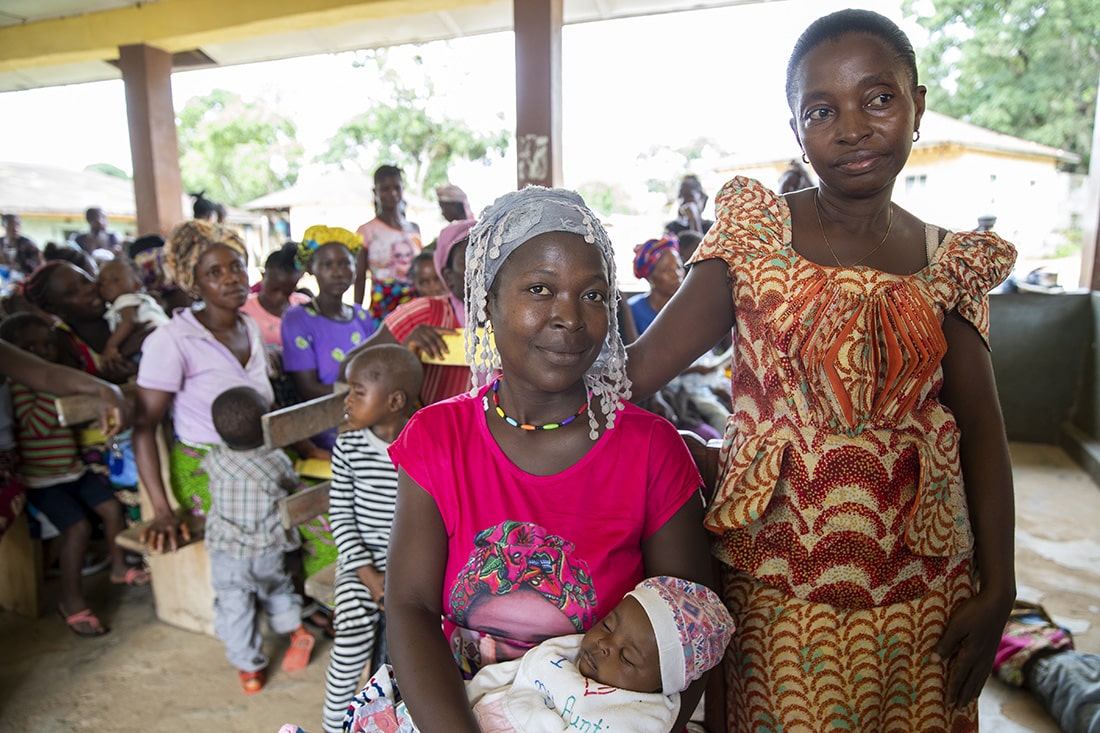
Lead mothers impart a wealth of health wisdom, but emphasize the importance of eight regular health checkups throughout the journey of pregnancy – at a minimum – and of giving birth at the hospital instead of at home. The government of Sierra Leone has begun taking this mandate very seriously: Women are now fined if they give birth at home. If they’re en route to the hospital but don’t quite make it in time, they must present the placenta to prove they were on their way.
Mary Aruna, 32, is one of the members of her group. She’s expecting her third child. Before participating in the group, Mary didn’t know about exclusive breastfeeding or the importance of a hospital delivery. She gave birth to her first two children, now ages 9 and 12, at home. This time, she plans to deliver in the hospital, and breastfeed exclusively (and on demand — not just at specific times of day).
“Project HOPE has encouraged me to go to the clinic, eight times, and advised me on how to see signs of danger,” says Mary.
She’s also learned about family planning and hygiene practices from Amiie, as well as malaria prevention methods using mosquito nets.
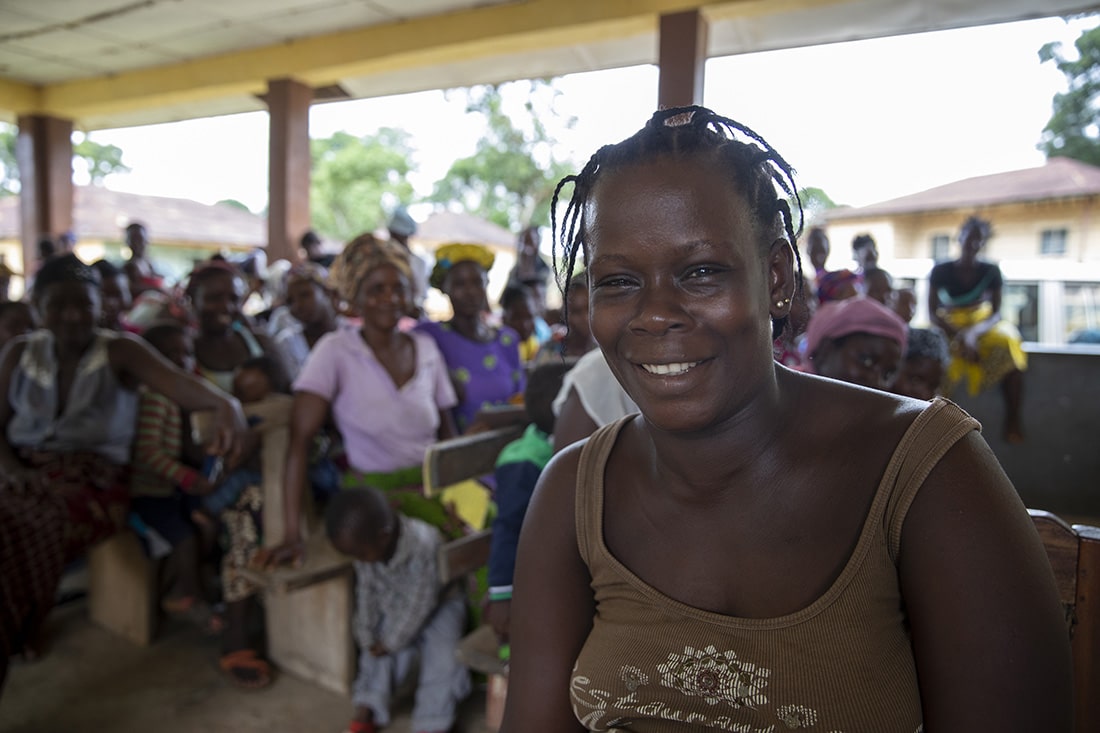
Another important component of the mother care groups is the Village Savings and Loan (VSL) program. Project HOPE is offering financial education, business training and loans to grant women greater autonomy and security – a significant step for a society deeply rooted in patriarchy. Women are learning how to save the small amounts of money they earn through activities like gardening and petty trading, and are able to request loans for business support and medical expenses.
“All of the support has helped us reduce maternal and neonatal deaths, drastically. It’s been a great help,” says Amiie.
Baindu Mansaray, 55, has been the lead mother in the nearby village of Ndogbogoma for over a year. Her group has developed a similar rapport to the group in Yamandu — meetings are a highlight of the week, a special gathering of singing, dancing and knowledge-sharing. But providing one-one-one support to pregnant women and new mothers is her favorite part of the work.
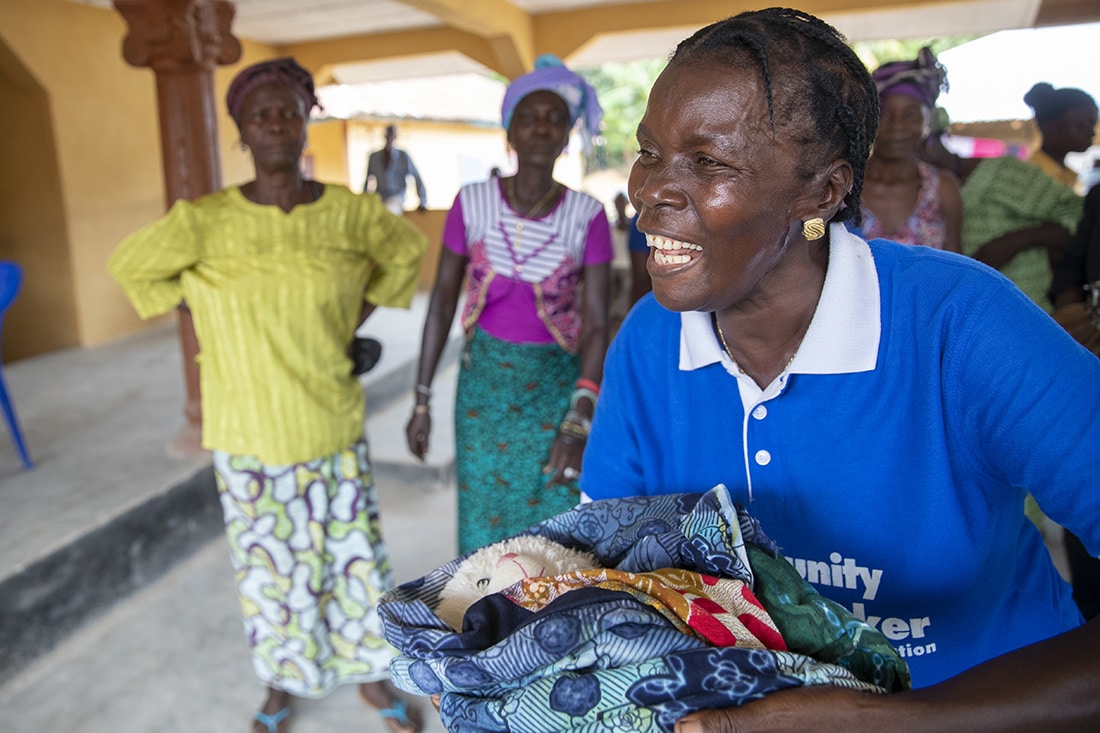
She’s also grateful for the VSL program; she’s received training on small enterprise development. She hasn’t taken a loan out herself, but has seen a woman borrow money in order to be able to get special emergency medical treatment for her baby.
“There are many [people] who come to help. But the most valuable has been Project HOPE…”
Baindu has six children, ranging in age from 21 to 42. She says her pregnancies would have gone a lot smoother, if she knew then what she knows now. Instead she shares the knowledge with younger women in her village, uplifting and strengthening others on their journey to and through motherhood — one of the most simultaneously trying and soul-gratifying endeavors anyone could ever undertake. It takes a village no matter where you live, but especially here in Sierra Leone.
How you can help
Make a lifesaving gift to support our work now and for the future at projecthope.org/donate.
Are you a health-care or other professional who would like to learn more about volunteering abroad with Project HOPE? Learn more about our volunteer program and join our volunteer roster.
Stay up-to-date on this story and our lifesaving work around the world by following us on Facebook, Instagram, LinkedIn and Twitter, and help spread the word by sharing stories that move and inspire you.